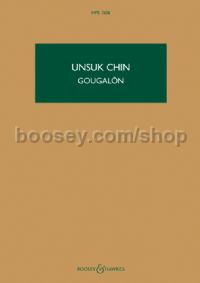Gougalon (Hawkes Pocket Score - HPS 1506) (Mixed Ensemble)
Gougalon (Hawkes Pocket Score - HPS 1506) (Mixed Ensemble)
* Estimated price converted from UK retail price
Composer's Notes
I. Prologue – Dramatic Opening of the Curtain
II. Lament of the Bald Singer
III. The Grinning Fortune Teller with the False Teeth
IV. Episode between Bottles and Cans
V. Circulus vitiosos – Dance around the shacks
VI. The Hunt for the Quack’s Plait
The title derives from Old High German. Inherent in it are the following meanings: to hoodwink; to make ridiculous movements; to fool someone by means of feigned magic; to practice fortune-telling.
The title refers to a Proustian moment I experienced – entirely unexpectedly – during my first sojourn in China: in 2008 and 2009 I visited Hong Kong and Guangzhou, among other places. The atmosphere of the old and poor residential neighbourhoods with their narrow, winding alleys, ambulatory food vendors, and market places – all this not far from supersized video screens, ultramodern buildings, and glittering shopping centers – brought to mind long forgotten childhood experiences. It reminded me very much of Seoul of the 1960s, of the period after the Korean War and before the radical modernization. Of conditions that no longer exist in today’s (South) Korea.
I was particularly reminded of a troupe of entertainers I saw a number of times as a child in a suburb of Seoul. These amateur musicians and actors travelled from village to village in order to foist self-made medicines – which were ineffective at best – on the people. To lure the villagers, they put on a play with singing, dancing, and various stunts. (I still recall that the plots almost always had to do with unrequited love, and that the performance inevitably ended with the heroine’s suicide.) This was all extremely amateurish and kitschy, yet it aroused incredible emotions among the spectators: this is hardly surprising, considering that it was practically the only entertainment in an everyday life marked by poverty and repressive structures. Entertainment electronics and toys (not to mention art) were of course unknown. Therefore, the whole village was present at this "big event", a circumstance from which others also desired to profit: fortune-tellers, mountebanks, and travelling hawkers. Among these were also wig dealers from whom young girls could earn some money for their families by sacrificing their pigtails.
Gougalon does not refer directly to the dilettante and shabby music of that street theater. The memories described above merely provide a framework, just as the movement headings are not intended to be illustrative.
This piece is about an "imaginary folk music" that is stylized, broken within itself, and only apparently primitive.
© Unsuk Chin (translation: Howard Weiner)



